 ICRH Global Newsletter ICRH Global Newsletter September, 2019 |
Message from the Chair Prof. Dr. Marleen Temmerman
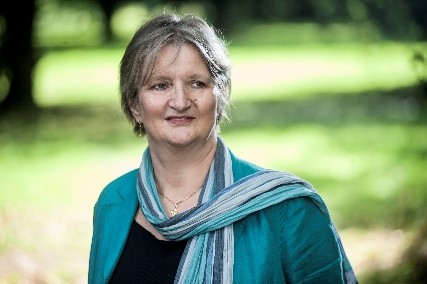 There is good news and bad news. Let’s start with the good news: adolescent and young voices are stronger, louder and clearer than ever, and the ‘nothing about us without us’ is resonating everywhere. Adolescents and young people health and rights are more prominent on the global and local agenda’s and no debate, panel, conference without young people on stage. This does not always implies that their priorities are supported and prioritised by the powers in place, but one has to start somewhere and making noise, amplify voices and empowering the young generations to flight for their rights will and must lead to change. There is good news and bad news. Let’s start with the good news: adolescent and young voices are stronger, louder and clearer than ever, and the ‘nothing about us without us’ is resonating everywhere. Adolescents and young people health and rights are more prominent on the global and local agenda’s and no debate, panel, conference without young people on stage. This does not always implies that their priorities are supported and prioritised by the powers in place, but one has to start somewhere and making noise, amplify voices and empowering the young generations to flight for their rights will and must lead to change.
There is also bad news in one of the area’s close to my heart. Contraceptives and family planning, core to demography, sexual and reproductive health and rights, as well as to environmental health, remain neglected. What should be a basic right for everyone—the ability to control their fertility and choose if and when they want a child—is also very much determined by the political environment. In the August Lancet Global Health, Nina Brooks and colleagues tackle the thorny topic of the Mexico City Policy—the legislation that prevents US federal funding from being used overseas to support organisations that perform or counsel on abortion. Using data from 26 African countries over 20 years, they show how the abortion rate rose by 40% in countries exposed to the policy relative to women in low-exposure countries and to periods when the policy was removed—a pattern inversely mirrored by the prevalence of modern contraceptive use. But contraceptive use is not determined by policy only, and numerous more personal factors—knowledge, preferences, parity—add another layer of complexity. Even when access to contraceptives is secured, low continuation rates illustrate that family planning efforts must extend beyond capturing new users into ensuring that contraception remains an exercised right throughout the reproductive life.
And we know that the unmet need is great and progress in addressing it is unequal in different countries and will require a multifactorial approach. The ICPD 1994 victory of reproductive rights for all, is still part of the unfinished agenda 25 years later, but the work continues.
Looking forward to welcome you all in Nairobi for the ICPD+25 Nairobi Summit where we celebrate 25 years post ICPD and 25 years ICRH, born in the aftermath of ICPD 1994.
The journey from Cairo to Nairobi is a long one but together we will reach our goals and succeed to make the world a better place with more equity, freedom, and solidarity and peace. Prof. Marleen Temmerman |
Supporting civil society engagement in the Every Woman Every Child movement in Mozambique ICRH-Mozambique has won a small grant on behalf of the Reproductive and Sexual Rights Network to support Mozambican civil society engagement, alignment, and coordinated action for improved women’s, children’s, and adolescents’ health (WCAH).  The grant was obtained from the GFF (Global Financing Facility) / MSH (Management Sciences for Health). The GFF is an international funding mechanism supporting country-level implementation of the Global Strategy for Women’s, Children’s and Adolescents’ Health as part of the Every Woman, Every Child movement. In Mozambique it has been providing funds since 2018 to develop and now implement of the Investment Case for Reproductive, Maternal, Newborn, Child and Adolescent Health (RMNCAH). The GFF recognises and aims to support the important role of civil society in ensuring that programmes and policies are anchored in the reality of the populations they aim to serve, ensuring that the most marginalised and vulnerable are reached. The grant was obtained from the GFF (Global Financing Facility) / MSH (Management Sciences for Health). The GFF is an international funding mechanism supporting country-level implementation of the Global Strategy for Women’s, Children’s and Adolescents’ Health as part of the Every Woman, Every Child movement. In Mozambique it has been providing funds since 2018 to develop and now implement of the Investment Case for Reproductive, Maternal, Newborn, Child and Adolescent Health (RMNCAH). The GFF recognises and aims to support the important role of civil society in ensuring that programmes and policies are anchored in the reality of the populations they aim to serve, ensuring that the most marginalised and vulnerable are reached.
This project focusses on informing civil society organisations about national WCAH priorities and the GFF, and building capacity of the Rede DSR and its member organizations in Tete and Gaza provinces to strengthen monitoring, advocacy and communication actions, focusing on SRH information and services for adolescents and young people. The project includes consultation with young people themselves about the policies and programmes that affect them. |
| EVENTS |
 ICRH’s 25th anniversary - SAVE THE DATE! ICRH’s 25th anniversary - SAVE THE DATE!
You are all invited to join us in the celebration of ICRH’s 25th anniversary. Festivities will be held in Belgium on 26 November 2019 , and on 15 November 2019 in Kenya. More information will follow soon, but don’t hesitate to contact icrh@ugent.be (Belgium) or info@icrhk.org (Kenya) if you have any further questions. |
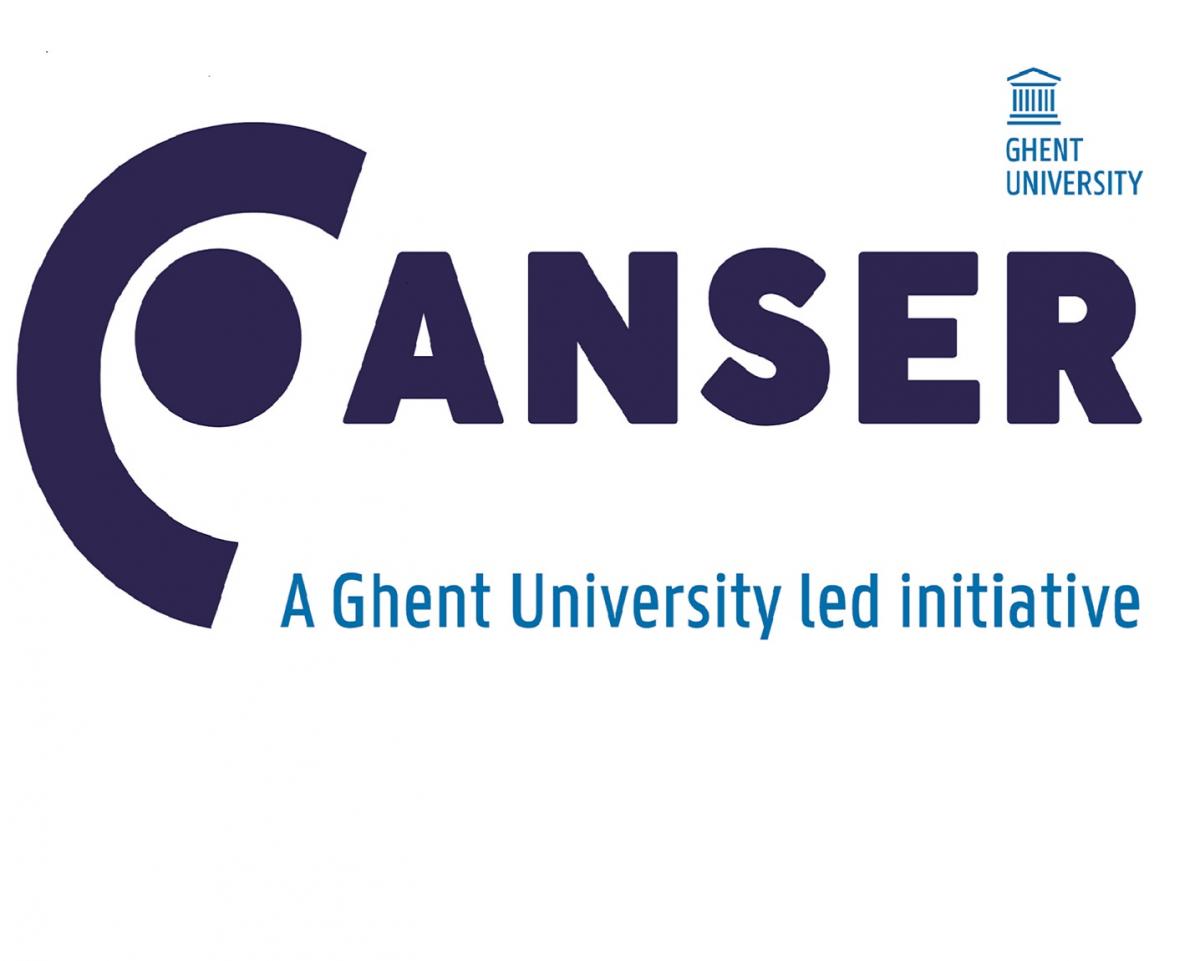 Annual ANSER conference, 25-26 November 2019, Ghent (Belgium) Annual ANSER conference, 25-26 November 2019, Ghent (Belgium)
The first day of the conference of the Academic Network for Sexual and Reproductive Health and Rights Policy (ANSER) is dedicated to implementing the ICPD Program of Action in the UNFPA EECA region. The second day focuses on building an evidence for the outcomes of the ICPD+25 Agenda. The full programme and more information is available on the ANSER website. |
The Mombasa Journal club hosted by ICRH-Kenya
 The Mombasa research group journal club is held once a month, and was initiated jointly by ICRH, Aga Khan University Mombasa Research Office, and University of Washington, Mombasa. Journal clubs aim to improve research capacity among junior investigators and promote collaboration among the institutions. This month the journal club was hosted by ICRH-Kenya. The Mombasa research group journal club is held once a month, and was initiated jointly by ICRH, Aga Khan University Mombasa Research Office, and University of Washington, Mombasa. Journal clubs aim to improve research capacity among junior investigators and promote collaboration among the institutions. This month the journal club was hosted by ICRH-Kenya.
Researchers from ICRH-Kenya, Aga Khan University, University of Washington, Mombasa Research Office and Kwale County Research Department (32 in total) attended this month’s journal club. Young researchers made presentations on ongoing research and received support and mentorship from senior colleagues. |
| PROJECTS |
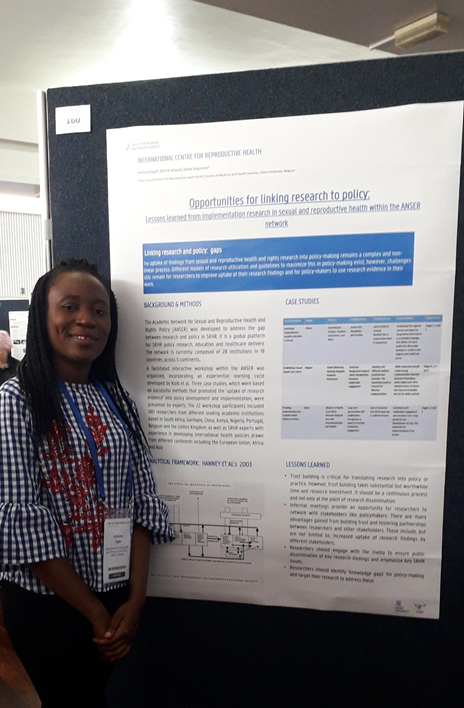 Opportunities for linking research to policy. Poster presentation by Emilomo Ogbe at the HSR conference Opportunities for linking research to policy. Poster presentation by Emilomo Ogbe at the HSR conference
At the 2019 HSR UK Conference in Manchester (UK), dedicated to addressing health systems challenges and health policies around the world, Emilomo Ogbe (researcher at ICRH Belgium) presented a poster on key recommendations for engaging policy makers to promote evidence based sexual and reproductive health policies. The presentation summarised lessons learned from the implementation of research in sexual and reproductive health within Academic Network for Sexual and Reproductive Health and Rights Policy (ANSER). The full publication is published open access and can be consulted here. |
ICRH researcher joins call in Lancet Oncology to decrease price of new essential cancer medicines ICRH's Dr. Katrina Perehudoff joined health researchers and advocates issuing a call in Lancet Oncology for governments & stakeholders to act now to decrease the price of new essential cancer medicines. 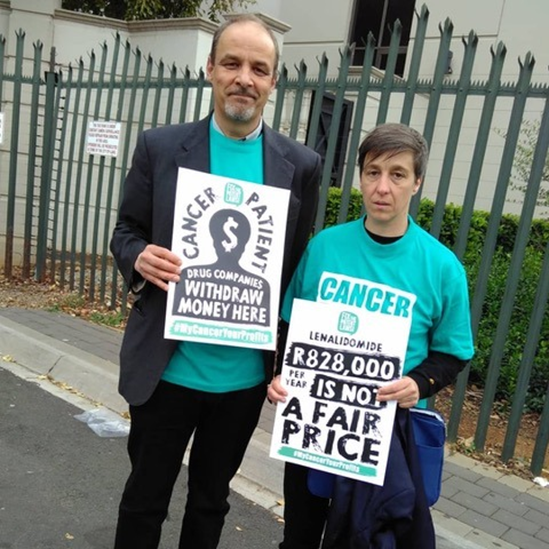 This call comes after WHO added 10 new cancer therapies to its 21st Model List of Essential Medicines in July 2019. Labeling medicines as essential, means that they have proven their utility and should be available and affordable to all, moving towards increasing access to cancer medicines in low-income and middle-income countries. Dr. Perehudoff and her co-authors urge governments to expand access to these new medicines with strategies used in the past to scale-up access to HIV and Hepatitis C therapies. This call comes after WHO added 10 new cancer therapies to its 21st Model List of Essential Medicines in July 2019. Labeling medicines as essential, means that they have proven their utility and should be available and affordable to all, moving towards increasing access to cancer medicines in low-income and middle-income countries. Dr. Perehudoff and her co-authors urge governments to expand access to these new medicines with strategies used in the past to scale-up access to HIV and Hepatitis C therapies.
You can read the full article here. |
Webinar on new tools to monitor national SRHR action plans Country representatives responsible for developing a national SRHR action plan to accelerate the ICPD agenda, can now use two new tools to help them monitor and evaluate their plans. ICRH and UNFPA EECARO presented the tools during a webinar that is available online.  On the 3rd of September ICRH co-organised together with UNFPA EECARO a webinar for government and UNFPA representatives in the region working on the development, implementation or evaluation of national SRHR action plans that need to strengthen the implementation of the ICPD agenda. The webinar focused on two tools that have been developed by ANSER. First, a set of indicators to measure and monitoring the action plans and secondly, a quality assurance checklist to take into account other international agreements related to SRHR. The speakers clearified how ICRH and ANSER could provide technical assistance to countries to strengthen their plans and pointed out a set of recommendations for countries to take into account when starting the work. On the 3rd of September ICRH co-organised together with UNFPA EECARO a webinar for government and UNFPA representatives in the region working on the development, implementation or evaluation of national SRHR action plans that need to strengthen the implementation of the ICPD agenda. The webinar focused on two tools that have been developed by ANSER. First, a set of indicators to measure and monitoring the action plans and secondly, a quality assurance checklist to take into account other international agreements related to SRHR. The speakers clearified how ICRH and ANSER could provide technical assistance to countries to strengthen their plans and pointed out a set of recommendations for countries to take into account when starting the work.
You want to know more? Please find the recording of the webinar here. |
| PEOPLE |
Bo Verb erckmoes erckmoes Bo Verberckmoes is Master in medicine and last year resident in obstetrics and gynecology. Currently started as a doctoral student working on the H2020 Elevate project. Besides that, working in the Women’s Clinic at the University Hospital of Ghent as a gynecologist in training with a special interest in pelvic oncology. More information: Bo.Verberckmoes@ugent.be 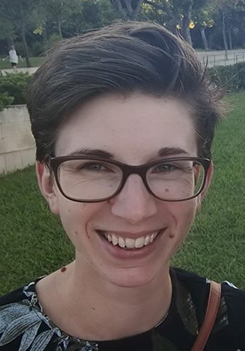 Emmie Vanhooren Emmie Vanhooren
Emmie Vanhooren, midwife since 2013, joined the ICRH team in Belgium as study nurse on the H2020 Elevate project. Emmie is passionate about healthcare worldwide. She worked in Uganda for a year and completed the course in ‘Tropical Medicine for Bachelors in Nursing and midwifery’ at the ITM in Antwerp in 2017. She gained nursing experience on a surgical ward performing night duties and worked as a temporary midwife in the Ghent region. More information: emmie.vanhooren@uzgent.be .  Emilie Berghmans Emilie Berghmans
Emilie Berghmans, clinical psychologist, started as research assistant at ICRH Belgium, working on the French-speaking chatline for victims after sexual violence, a pilot project aimed at giving anonymous support and advice to these victims and lowering the threshold for them to contact a sexual assault care centre. She completed an internship in Colombia, working with female victims of the Colombian conflict. After returning to Europe she was a volunteer at the refugee camp of Ragusa, in Sicily. Afterwards, she worked for a foster care organisation. More information: emilie.berghmans@ugent.be  Estelle Cohidon Estelle Cohidon
Also Estelle Cohidon started as research assistant at ICRH Belgium for the French-speaking chatline for victims after sexual violence. Estelle is a young psychologist from Brussels with master’s degree in clinical psychology from ULB and different post-masters from different institutions (Specialization in trauma, ULB / Tobbacologist, FARES / Hypnosis, AFNH….). She is passionate about the link between body and mind. That’s why every day she works with patients with chronic somatic disorders on their current and past problems. Estelle divides her time between ICRH, CHU Saint-Pierre in Brussels and her private practice. More information : estelle.cohidon@ugent.be
|
 Mr. Rongxin He is an exchange student from China, studying for a doctor's degree in Public Management at Xi’an Jiaotong University. He joins the ICRH Belgium team for 12 months for to do research on spatial statistics in health, like the spatio-temporal epidemiology for women’s cancer in China. Always welcome to contact Rongxin.He@UGent.be Mr. Rongxin He is an exchange student from China, studying for a doctor's degree in Public Management at Xi’an Jiaotong University. He joins the ICRH Belgium team for 12 months for to do research on spatial statistics in health, like the spatio-temporal epidemiology for women’s cancer in China. Always welcome to contact Rongxin.He@UGent.be
Dr. Pei Wang is a clinical microbiologist and director of the Department of Laboratory Medicine at The First People's Hospital of Jingmen, Hubei Province, China. His interests focus on rapid detection and identification of pathogens from clinical specimens. He is planning to establish a study titled incidence and detection method evaluation of invasive Group B Streptococcus among newborns in central China. He is a visiting scholar, staying for 2 months. Ms. Di Xiao is a PhD student at the School of Public Health, Sun Yat-Sen University in China. Her research focuses on the influence factors of sleep disturbance among Chinese adolescents. She is at Ghent University for 7 months, collaborating with the ICRH research team. |
| |
Perehudoff SK, Alexandrov NV, Hogerzeil HV. The right to health as the basis for universal health coverage: A cross-national analysis of national medicines policies of 71 countries. PloS one. 2019 Jun 28;14(6):e0215577. https://biblio.ugent.be/publication/8629740
Moreau C, Li M, De Meyer S, Loi Vu Manh, Guiella G, Acharya R, Bello B, Maina B., Mmari K. Measuring gender norms about relationships in early adolescence: Results from the global early adolescent study. (2019) SSM-POPULATION HEALTH. 7. https://biblio.ugent.be/publication/8629736
Frederico, M., Arnaldo, C., Michielsen, K., & Decat, P. (2019). Adult and young women communication on sexuality: a pilot intervention in Maputo-Mozambique. Reproductive Health, 16(1), 144. https://biblio.ugent.be/publication/8629746
Lang’at E, Mwanri L, Temmerman M. Effects of implementing free maternity service policy in Kenya: an interrupted time series analysis. BMC Health Services Research, volume 19, Article number: 645 (2019). https://biblio.ugent.be/publication/8629751
Temmerman M. A new woman-controlled contraceptive vaginal ring: a global step forward. Lancet Glob Health. 2019 Aug;7(8):e986-e987. Article |
| |
| |
 The Mombasa research group journal club is held once a month, and was initiated jointly by ICRH, Aga Khan University Mombasa Research Office, and University of Washington, Mombasa. Journal clubs aim to improve research capacity among junior investigators and promote collaboration among the institutions. This month the journal club was hosted by ICRH-Kenya.
The Mombasa research group journal club is held once a month, and was initiated jointly by ICRH, Aga Khan University Mombasa Research Office, and University of Washington, Mombasa. Journal clubs aim to improve research capacity among junior investigators and promote collaboration among the institutions. This month the journal club was hosted by ICRH-Kenya.


 There is good news and bad news. Let’s start with the good news: adolescent and young voices are stronger, louder and clearer than ever, and the ‘nothing about us without us’ is resonating everywhere. Adolescents and young people health and rights are more prominent on the global and local agenda’s and no debate, panel, conference without young people on stage. This does not always implies that their priorities are supported and prioritised by the powers in place, but one has to start somewhere and making noise, amplify voices and empowering the young generations to flight for their rights will and must lead to change.
There is good news and bad news. Let’s start with the good news: adolescent and young voices are stronger, louder and clearer than ever, and the ‘nothing about us without us’ is resonating everywhere. Adolescents and young people health and rights are more prominent on the global and local agenda’s and no debate, panel, conference without young people on stage. This does not always implies that their priorities are supported and prioritised by the powers in place, but one has to start somewhere and making noise, amplify voices and empowering the young generations to flight for their rights will and must lead to change. The grant was obtained from the GFF (Global Financing Facility) / MSH (Management Sciences for Health). The GFF is an international funding mechanism supporting country-level implementation of the Global Strategy for Women’s, Children’s and Adolescents’ Health as part of the Every Woman, Every Child movement. In Mozambique it has been providing funds since 2018 to develop and now implement of the Investment Case for Reproductive, Maternal, Newborn, Child and Adolescent Health (RMNCAH). The GFF recognises and aims to support the important role of civil society in ensuring that programmes and policies are anchored in the reality of the populations they aim to serve, ensuring that the most marginalised and vulnerable are reached.
The grant was obtained from the GFF (Global Financing Facility) / MSH (Management Sciences for Health). The GFF is an international funding mechanism supporting country-level implementation of the Global Strategy for Women’s, Children’s and Adolescents’ Health as part of the Every Woman, Every Child movement. In Mozambique it has been providing funds since 2018 to develop and now implement of the Investment Case for Reproductive, Maternal, Newborn, Child and Adolescent Health (RMNCAH). The GFF recognises and aims to support the important role of civil society in ensuring that programmes and policies are anchored in the reality of the populations they aim to serve, ensuring that the most marginalised and vulnerable are reached.


 This call comes after WHO added 10 new cancer therapies to its 21st Model List of Essential Medicines in July 2019. Labeling medicines as essential, means that they have proven their utility and should be available and affordable to all, moving towards increasing access to cancer medicines in low-income and middle-income countries. Dr. Perehudoff and her co-authors urge governments to expand access to these new medicines with strategies used in the past to scale-up access to HIV and Hepatitis C therapies.
This call comes after WHO added 10 new cancer therapies to its 21st Model List of Essential Medicines in July 2019. Labeling medicines as essential, means that they have proven their utility and should be available and affordable to all, moving towards increasing access to cancer medicines in low-income and middle-income countries. Dr. Perehudoff and her co-authors urge governments to expand access to these new medicines with strategies used in the past to scale-up access to HIV and Hepatitis C therapies.  On the 3rd of September ICRH co-organised together with UNFPA EECARO a webinar for government and UNFPA representatives in the region working on the development, implementation or evaluation of national SRHR action plans that need to strengthen the implementation of the ICPD agenda. The webinar focused on two tools that have been developed by ANSER. First, a set of indicators to measure and monitoring the action plans and secondly, a quality assurance checklist to take into account other international agreements related to SRHR. The speakers clearified how ICRH and ANSER could provide technical assistance to countries to strengthen their plans and pointed out a set of recommendations for countries to take into account when starting the work.
On the 3rd of September ICRH co-organised together with UNFPA EECARO a webinar for government and UNFPA representatives in the region working on the development, implementation or evaluation of national SRHR action plans that need to strengthen the implementation of the ICPD agenda. The webinar focused on two tools that have been developed by ANSER. First, a set of indicators to measure and monitoring the action plans and secondly, a quality assurance checklist to take into account other international agreements related to SRHR. The speakers clearified how ICRH and ANSER could provide technical assistance to countries to strengthen their plans and pointed out a set of recommendations for countries to take into account when starting the work. erckmoes
erckmoes


 Mr. Rongxin He is an exchange student from China, studying for a doctor's degree in Public Management at Xi’an Jiaotong University. He joins the ICRH Belgium team for 12 months for to do research on spatial statistics in health, like the spatio-temporal epidemiology for women’s cancer in China. Always welcome to contact
Mr. Rongxin He is an exchange student from China, studying for a doctor's degree in Public Management at Xi’an Jiaotong University. He joins the ICRH Belgium team for 12 months for to do research on spatial statistics in health, like the spatio-temporal epidemiology for women’s cancer in China. Always welcome to contact